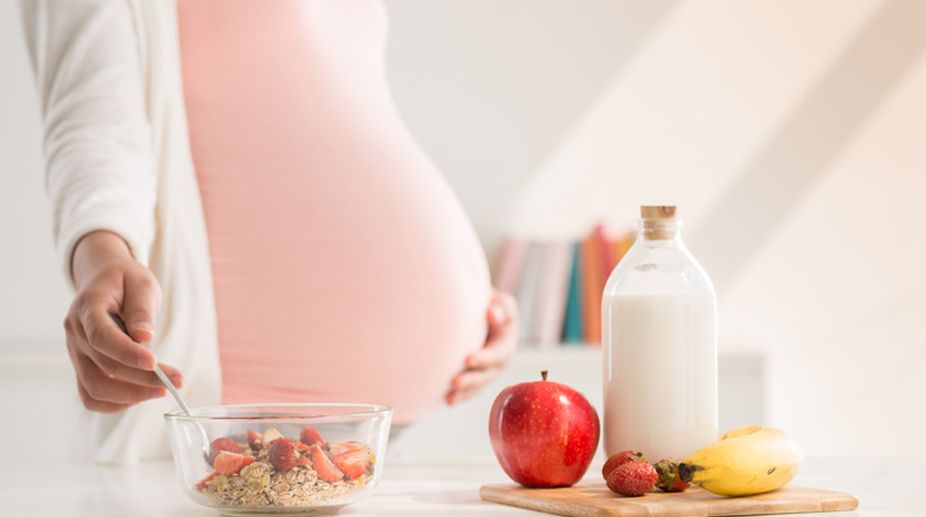Punarnava: The ayurvedic miracle for liver & kidney healing!
Ramdev recommends Punarnava for liver, kidney swelling & inflammation. Learn its benefits, uses, and how to consume it naturally.
The nine months leading up to the birth of your child are as important as the years to come after.

Pregnant woman preparing meal with milk and fruits (Photo Source: Getty Images)
The nine months leading up to the birth of your child are as important as the years to come after. It is, therefore, important to maintain a healthy and nutritious diet during your pregnancy. Here are some foods that must be added to your pregnancy diet:
FABULOUS FOLATE
Advertisement
Advertisement
Folate or folic acid is extremely important for a healthy pregnancy. It helps prevent neural tube defects (NTD) and brain and spinal abnormalities. Some foods that help supplement folic acid include spinach, broccoli, asparagus and eggs. Folic acid is also consumed through tablets along with prenatal vitamins.
FRUITFUL VEGETABLES
Whether in the form of juice, canned, dried or fresh, fruits and vegetables should be consumed five times a day. The fresher the produce, the higher the level of vitamins it contains. Keep in mind that eating fruits is always better than juicing it due to its high level of natural sugar
SAY YES TO CARBS
Foods like rice, potatoes, pasta and bread are high in carbohydrates. These give you a lot of energy, which is extremely important in a pregnancy diet.
BE KEEN ON PROTEIN
It is important to consume “healthy fats” and Omega-3 but don’t let fats take up more than 30 percent of your diet. Some good sources of healthy fats include; olive oil, sunflower oil, avocados, some nuts and seeds.
FRIENDLY FATS
It is important to consume ‘healthy fats’ and Omega-3 but don’t let fats take up more than 30 percent of your diet. Some good sources of healthy fats include; olive oil, sunflower oil, avocados, some nuts and seeds.
FIBRE FOR ALL
Foods rich in fibre such as wild rice, wholemeal bread, beans, wholegrain pasta, fruits and vegetables reduces the risk of constipation during pregnancy. It also reduces the risk of hemorrhoids, which is also common as the fetus grows.
DAILY DAIRY
Calcium plays a great part in the development of the baby as well as keeping the bones of the mother strong. Some calcium-rich foods include cheese, milk, yogurt, broccoli, beans and kale.
JUST ZINC ABOUT IT
Zinc has a major role to play in normal growth and development. Zinc promotes cell division and growth and is important for the progress of the fetus. The best sources of zinc are peanut butter, dairy products, chicken, rice and eggs.
IRON(WO)MAN
Iron makes up a huge part of the haemoglobin in our red blood cells, which carries oxygen throughout the body. During pregnancy, there is 50 percent increase in the amount of blood in the body and not enough iron. This can cause the mother to become anaemic and increases the risk of; preterm delivery, low-weight baby and lose a lot of blood during birth. Some rich sources of iron include whole grain cereals, egg yolk, spinach and poultry
While these nutritious foods are good for you throughout your pregnancy, their consumption pattern varies depending on the trimester you’re in
First trimester:
A well-balanced diet is a must throughout your pregnancy but essential roles are played by specific nutrients in the first trimester. These include basic water-soluble vitamins like folic acid and Vitamin C. Folic acid helps prevent several birth defects and serious problems related to the brain and spinal cord. While Vitamin C is important throughout your pregnancy, it supports your often-burdened immune system in the first trimester. These nutrients can be found in: Folic Acid- dark leafy greens and eggs Vitamin C- oranges, strawberries and raw spinach
Second trimester:
Iron become key in the second trimester as this is when the blood content in the body increases by about 50 percent. The oxygen-carrying element in our red blood cells, hemoglobin, is mostly made up of iron. It is therefore extremely vital to maintain a good level of iron in the body so that sufficient oxygen and blood reaches both your organs and that of your child’s. Vitamin C is also important in this trimester as it helps the blood absorb the iron and makes the hemoglobin all the more effective.
Third trimester:
The nutritional requirements of the baby are highest in this trimester. Iron and protein are crucial for the proper growth and cellular development of the baby. Calcium is also extremely important for the baby’s bone development. Healthy fats and omega-3 play a pivotal role in the third trimester. They ensure the development of the baby’s brain, which is made up of 60 percent fat and make women less susceptible to postpartum depression. Healthy fats also add protective padding to the baby and contribute to additional stores in preparation for breastfeeding. Other important nutrients include Vitamins D3 and K2. These are extremely important for bone health and can be found in salmon, egg yolk, soy milk and cheese, butter, spring onion, cabbage and chicken.
Over to you:
It is important to have a healthy and balanced diet for the health and growth of your child as well as for your well-being. It is also vital to know which nutrients are most beneficial for you during every phase of your pregnancy. So stay healthy and enjoy your path to motherhood.
Advertisement